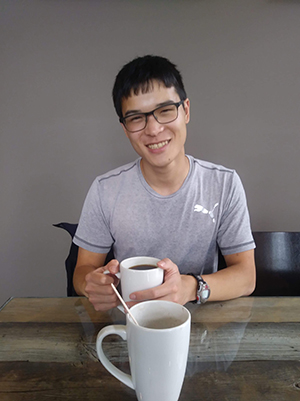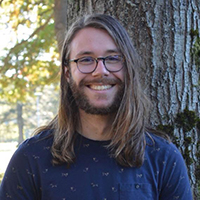Universal Inheritance: Chris Horne in Conversation with A.R. Kung

Malahat Review volunteer Chris Horne talks with A.R. Kung, winner of the 2020 Far Horizons Award for Poetry, about his piece, "Flight," which appears in our fall issue #212.
A.R. (Alex) Kung is a 22-year-old poet from Victoria. Though he holds no degrees, he spent two years as a Writing undergrad at UVic before joining the Canadian Coast Guard. He writes out of admiration for the history and literature of Imperial China, and is working on a poetry collection written in dialogue with great poets of the Tang Dynasty (7-9th century). In 2017, he won UVic's Diversity Writing Contest in poetry, and his work has appeared in Grain. He is also a Younglife Capernaum leader and a classical pianist, and is attempting to learn Mandarin Chinese and traditional calligraphy.
Read what judge Yusuf Saadi had to say about A.R. Kung's winning poem.
Your poem is, as a whole, “tensioned between lift and burden”—you deftly balance contradictory states of hope and despair throughout, pitting the weight of the poet’s earthbound suffering against the weightlessness of his airborne poetic imagination. Do you feel that a poem should remain grounded in its historical and authorial context, however difficult, or that a reader (or imitator) is free to indulge in flights of the imagination?
If I didn’t permit myself to enhance or fully re-imagine the context of classical literature to stoke my creativity, I don’t know what I’d write. All my work involves poeticizing history. My two favourite subjects—the An Lushan Rebellion and the fall of Western Rome/survival of the Byzantines and Christianity—carry complex burdens. I wrestle between history and invention with every poem. Often the best entry is a “lifting” of sorts—to imagine redemption through whatever beauty my poetry brings, even when none occurred. As for what *should* happen, I believe acknowledging a poem’s intent is essential to respect the people behind the work, as poems are indisputably artifacts of their context. They should not, however, be sequestered like museum pieces. Poetry can (should?) be an open dialogue spanning centuries and cultures, and I think it’s permissible to liven this conversation through fantasy.
Du Fu has garnered a reputation as “poet-historian,” a witness to both the political workings of a nation troubled with rebellion and the hardships of those who lived within it; however, his moral character has been reimagined over time—from the very picture of dynastic loyalty and Confucian moral values, as critics during the Song dynasty saw him, to a poet of the people whose use of vernacular language speaks to his sympathy with the common man. “Flight” seems preoccupied with memory and legacy, but the lines “(he is / what he was). / what we will remember)” suggest that the poet’s historical self is eclipsed by his readers’ shifting image of him. How do you tend to approach reimagination or misrepresentation in (and of) your poetry?
Misrepresentation is inevitable, as it has been underway for millennia. Du Fu the poet-sage has grown beyond what Du Fu the man could conceive: in 765, he wrote: “could writing bring renown?/Old and ill, I resign my post[…]afloat, adrift, what is my likeness?/Between Heaven and Earth, one black gull.” The very homesickness and resignation to oblivion which infuses his later work has made him emblematic of his troubled times. I don’t have a unified approach to reimagination, other than to examine it ceaselessly. I do have an obligation to authenticity. This is complicated by how much has been lost, romanticized, or forged in 1250 years. Certain Tang poets, like Li Bai, are both folk heroes and historical figures, and these aspects can become nearly indistinguishable. Creating imitations in English requires invention.
Du Fu is also known to have revised his poems extensively. Literary historians attest that he lost much of his early work (which, by his own estimate, he began at the age of seven) in his flight from Chang’an and was forced to rewrite it from memory; you allude to a similar loss in the line “his papers soaked, decades of writing abandoned.” Here and throughout this poem, you have formalized the act of revision by including palimpsestic strikethroughs. What drove you to make these revisions so transparent in “Flight”? What importance do you place on revision in your poetry at large?
The form of “Flight” developed after several free-verse drafts from different perspectives—one from Du Fu, one from Sun Zai (the man who saved the Du family), and one omniscient. I struggled to capture a terror beyond words. The violence and suffering within this historical moment caused me to confront many insecurities I have with my work: that I have never experienced war or displacement, and am therefore unfit to write about it; that a single poetry collection can never capture the cataclysm and human toll of the rebellion; that my efforts will only lacquer a fantasy over a complete, self-contained history. I felt as if I were manipulating different versions of the story, and this led me to create a form which layered multiple narratives, yet kept them intimately linked (I don’t know if I’m the first, and I don’t know what to call it, but I’ll be using it again).
Revision makes my poetry. I usually write traditional forms—I especially love the ardours of a sonnet, the childlike whimsy of ballad verse, and the musical repetition of pantoums, villanelles, and sestinas. These require many drafts. Sometimes I’ll start a piece, get stuck, and re-write it in a different form with the same images and subject. In this way, some poems take over a year (I started writing notes and images for “Flight” in February 2019 and made my last revisions in March 2020). I also constantly learn more about Tang poetry and the Dynasty, which affects what and how I write and compels me to revise or rewrite my earlier work.
You note in your bio that you’re working on a poetry collection in dialogue with poets of the Tang dynasty. Can you tell us more about that project? What other voices might we expect to see included in the collection?
Inheritance—tentative title—explores events from 690-850 through the personas of poets in traditional forms, free verse, and a few made-up forms like in “Flight.”
Section I follows Shangguan Wan’er, a slave turned poet and courtier, through her service to the (allegedly) tyrannical Wu Zetian, the only woman to rule as Emperor. Perhaps the most renowned writer of her own time, few personal details and only 32 of Shangguan’s poems have survived. I’m working largely from conjecture in hopes that I can do right by an unjustly neglected poet.
Section II spans 712-755, as Emperor Xuanzong’s rule returns the Tang to the wealth, prestige, and power enjoyed under Taizong. Poetry remains the highest art, and here the most celebrated generation of poets—Meng Haoran, Li Bai, Du Fu, Wang Wei, and others—develop their voices. Spiritually curious, verse emblazoned with immediacy and 1000 years of literary history, they write of a world which promises eternal prosperity and stability.
In December 755 (Section III), General An Lushan and his elite northern armies rebel, destroy loyalist forces, and take Chang’an by July 756. This is where we find Du Fu in “Flight.” The Tang army fragments; the Tibetan Empire invades; the census records 52.9 million people in 754 and 16.9 million in 764.Wang Wei is captured and charged with treason, Li Bai drowns in the Yangtze, and Du Fu dies a homeless, destitute refugee.
Section IV runs through the many great poets of the Mid-Tang—Bai Juyi, Yuan Zhen, Xue Tao, Li He, Li Shangyin—a chorus of voices lamenting a crippled empire. Disunity, rebellion, and militarism haunt China through the fall of the Tang until the Song Dynasty in the 10th century.
I started this project in 2017, and I expect to finish in 2-3 years. I’ve been very shy about submitting my poems, but I hope I’ll have the courage to share more of this series soon.
You are also a classical pianist. The contrapuntal voices in “Flight” hint at a kind of poetic fugue, albeit one in which one voice has been deliberately muted. How does your interest in music influence your poetry?
I’ve played music for far longer than I’ve written poetry, so it’s possible that my tendency to write poems with multiple, overlapping voices and variations on a central theme originated with piano. Perhaps it’s also behind my enjoyment of traditional forms. If so, the effect is mainly subconscious.
More importantly, music shapes my perception of my work. Learning a classical piano piece is, far as I’ve found, the most intimate experience of historical art. Classical music influences how I view my relationship with my subjects, namely Tang poetry. I often doubt my legitimacy to dialogue with one of the greatest generations of poets in history; who am I, an unknown poet living on a far continent and writing in a foreign language 1200 years later? I ground myself in the rationale that, as with the works of Mozart or Beethoven, it’s right for their brilliance to inspire further creativity. Their sufferings and triumphs are a universal inheritance. My intent is not to supplant their words, but “play” their legacy.

Chris Horne
* * * * * * * *









